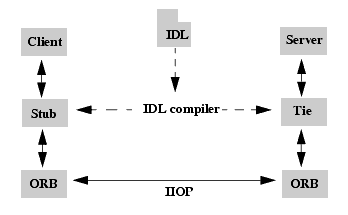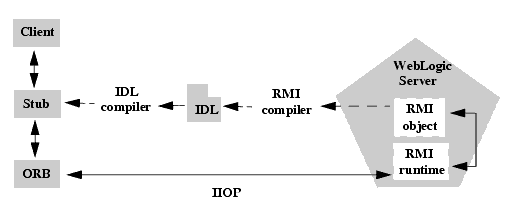10 Developing a CORBA/IDL Client
This chapter describes how to develop clients for heterogeneous distributed applications. RMI over IIOP with CORBA/IDL clients involves an Object Request Broker (ORB) and a compiler that creates an interoperating language called IDL. C, C++, and COBOL are examples of languages that ORBs may compile into IDL. A CORBA programmer can use the interfaces of the CORBA Interface Definition Language (IDL) to enable CORBA objects to be defined, implemented, and accessed from the Java programming language.
Guidelines for Developing a CORBA/IDL Client
Using RMI-IIOP with a CORBA/IDL client enables interoperability between non-Java clients and Java objects. If you have existing CORBA applications, you should program according to the RMI-IIOP with CORBA/IDL client model. Basically, you will be generating IDL interfaces from Java. Your client code will communicate with WebLogic Server through these IDL interfaces. This is basic CORBA programming.
The following sections provide some guidelines for developing RMI-IIOP applications with CORBA/IDL clients.
For further reference see the following Object Management Group (OMG) specifications:
-
Java Language to IDL Mapping Specification at
http://www.omg.org/cgi-bin/doc?formal/01-06-07 -
CORBA/IIOP 2.4.2 Specification at
http://www.omg.org/cgi-bin/doc?formal/01-02-33
Working with CORBA/IDL Clients
In CORBA, interfaces to remote objects are described in a platform-neutral interface definition language (IDL). To map the IDL to a specific language, you compile the IDL with an IDL compiler. The IDL compiler generates a number of classes such as stubs and skeletons that the client and server use to obtain references to remote objects, forward requests, and marshall incoming calls. Even with IDL clients it is strongly recommended that you begin programming with the Java remote interface and implementation class, then generate the IDL to allow interoperability with WebLogic and CORBA clients, as illustrated in the following sections. Writing code in IDL that can be then reverse-mapped to create Java code is a difficult and bug-filled enterprise, and Oracle does not recommend it.
IDL Client (Corba object) relationships

Description of the illustration corba_idl.gif
Java to IDL Mapping
In WebLogic RMI, interfaces to remote objects are described in a Java remote interface that extends java.rmi.Remote. The Java-to-IDL mapping specification defines how an IDL is derived from a Java remote interface. In the WebLogic RMI over IIOP implementation, you run the implementation class through the WebLogic RMI compiler or WebLogic EJB compiler with the -idl option. This process creates an IDL equivalent of the remote interface. You then compile the IDL with an IDL compiler to generate the classes required by the CORBA client.
The client obtains a reference to the remote object and forwards method calls through the stub. WebLogic Server implements a CosNaming service that parses incoming IIOP requests and dispatches them directly into the RMI run-time environment.
WebLogic RMI over IIOP object relationships

Description of the illustration rmi_iiop.gif
Objects-by-Value
The Objects-by-Value specification allows complex data types to be passed between the two programming languages involved. In order for an IDL client to support Objects-by-Value, you develop the client in conjunction with an Object Request Broker (ORB) that supports Objects-by-Value. To date, relatively few ORBs support Objects-by-Value correctly.
When developing an RMI over IIOP application that uses IDL, consider whether your IDL clients will support Objects-by-Value, and design your RMI interface accordingly. If your client ORB does not support Objects-by-Value, you must limit your RMI interface to pass only other interfaces or CORBA primitive data types. The following table lists ORBs that Oracle has tested with respect to Objects-by-Value support:
Table 10-1 ORBs Tested with Respect to Objects-by-Value Support
| Vendor | Versions | Objects-by-Value |
|---|---|---|
|
Oracle |
Tuxedo 8.x C++ Client ORB |
Supported |
|
Borland |
VisiBroker 3.3, 3.4 |
Not supported |
|
Borland |
VisiBroker 4.x, 5.x |
Supported |
|
Iona |
Orbix 2000 |
Supported (Oracle has encountered problems with this implementation) |
For more information on Objects-by-Value, see "Limitations of Passing Objects by Value" in Programming RMI for Oracle WebLogic Server.
Procedure for Developing a CORBA/IDL Client
To develop an RMI over IIOP application with CORBA/IDL:
-
Follow steps 1 through 3 in Chapter 8, "Developing a Java SE Client."
-
Generate an IDL file by running the WebLogic RMI compiler or WebLogic EJB compiler with the
-idloption.The required stub classes will be generated when you compile the IDL file. For general information on the these compilers, refer to "Understanding WebLogic RMI" and Programming RMI for Oracle WebLogic Server. Also reference the Java IDL specification at Java Language Mapping to OMG IDL Specification at
http://www.omg.org/technology/documents/formal/java_language_mapping_to_omg_idl.htm.The following compiler options are specific to RMI over IIOP:
Table 10-2 RMI-IIOP Compiler Options
Option Function -idlCreates an IDL for the remote interface of the implementation class being compiled
-idlDirectoryTarget directory where the IDL will be generated
-idlFactoriesGenerate factory methods for value types. This is useful if your client ORB does not support the factory value type.
-idlNoValueTypesSuppresses generation of IDL for value types.
-idlOverwriteCauses the compiler to overwrite an existing idl file of the same name
-idlStrictCreates an IDL that adheres strictly to the Objects-By-Value specification. (not available with appc)
-idlVerboseDisplay verbose information for IDL generation
-idlVisibrokerGenerate IDL somewhat compatible with Visibroker 4.1 C++
The options are applied as shown in this example of running the RMI compiler:
> java weblogic.rmic -idl -idlDirectory /IDL rmi_iiop.HelloImpl
The compiler generates the IDL file within sub-directories of the idlDirectoy according to the package of the implementation class. For example, the preceding command generates a
Hello.idlfile in the/IDL/rmi_iiopdirectory. If theidlDirectoryoption is not used, the IDL file is generated relative to the location of the generated stub and skeleton classes. -
Compile the IDL file to create the stub classes required by your IDL client to communicate with the remote class. Your ORB vendor will provide an IDL compiler.
-
The IDL file generated by the WebLogic compilers contains the directives:
#include orb.idl. This IDL file should be provided by your ORB vendor. Anorb.idlfile is shipped in the/libdirectory of the WebLogic distribution. This file is only intended for use with the ORB included in the JDK that comes with WebLogic Server. -
Develop the IDL client.
IDL clients are pure CORBA clients and do not require any WebLogic classes. Depending on your ORB vendor, additional classes may be generated to help resolve, narrow, and obtain a reference to the remote class. In the following example of a client developed against a VisiBroker 4.1 ORB, the client initializes a naming context, obtains a reference to the remote object, and calls a method on the remote object.
Code segment from C++ client of the RMI-IIOP example
// string to object CORBA::Object_ptr o; cout << "Getting name service reference" << endl; if (argc >= 2 && strncmp (argv[1], "IOR", 3) == 0) o = orb->string_to_object(argv[1]); else o = orb->resolve_initial_references("NameService"); // obtain a naming context cout << "Narrowing to a naming context" << endl; CosNaming::NamingContext_var context = CosNaming::NamingContext::_narrow(o); CosNaming::Name name; name.length(1); name[0].id = CORBA::string_dup("Pinger_iiop"); name[0].kind = CORBA::string_dup(""); // resolve and narrow to RMI object cout << "Resolving the naming context" << endl; CORBA::Object_var object = context->resolve(name); cout << "Narrowing to the Ping Server" << endl; ::examples::iiop::rmi::server::wls::Pinger_var ping = ::examples::iiop::rmi::server::wls::Pinger::_narrow(object); // ping it cout << "Ping (local) ..." << endl; ping->ping(); }Notice that before obtaining a naming context, initial references were resolved using the standard Object URL (see the CORBA/IIOP 2.4.2 Specification, section 13.6.7). Lookups are resolved on the server by a wrapper around JNDI that implements the COS Naming Service API.
The Naming Service allows WebLogic Server applications to advertise object references using logical names. The CORBA Name Service provides:
-
An implementation of the Object Management Group (OMG) Interoperable Name Service (INS) specification.
-
Application programming interfaces (APIs) for mapping object references into an hierarchical naming structure (JNDI in this case).
-
Commands for displaying bindings and for binding and unbinding naming context objects and application objects into the namespace.
-
-
IDL client applications can locate an object by asking the CORBA Name Service to look up the name in the JNDI tree of WebLogic Server. In the example above, you run the client by entering:
Client.exe -ORBInitRef NameService=iioploc://localhost:7001/NameService